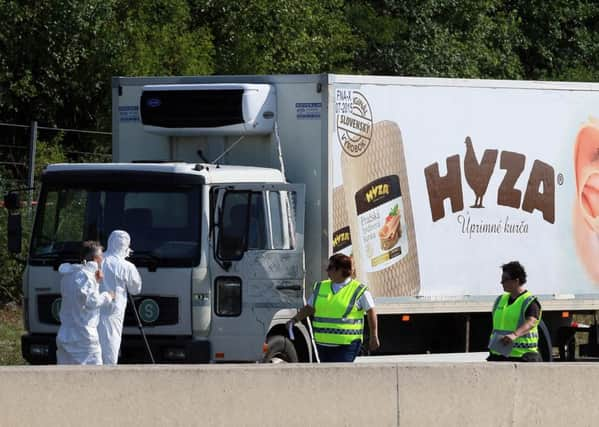Dani Garavelli: Response to refugees must change


How many boat-loads of men, women and children have to capsize before we acknowledge that those who perish in the Mediterranean aren’t chancers looking to exploit our benefits system, but the victims of the greatest humanitarian crisis – and certainly the greatest population shift – Europe has faced since the Second World War?
You’d think the sheer desperation of those who board speeding lorries or cram themselves into tiny, unventilated spaces in order to escape war and oppression would act as a vaccine against national self-interest and intransigence. But, as the crisis becomes more deeply entrenched so too do our defence mechanisms. Instead of opening our arms and our borders to the persecuted, we tie ourselves in knots trying to justify our inertia. “What can we do?” our politicians whine. “Our towns and cities are overwhelmed,” though the UK has taken fewer Syrian refugees than almost any other country in the EU.
Advertisement
Hide AdAdvertisement
Hide AdWe try to deflect attention from our own dereliction by focusing on the people-smugglers who profit from human misery. Those who prey on the world’s most vulnerable, promising them safe passage, then treating them as garbage, are surely beyond redemption. But there must also be a special place in Hell for governments who watch all this unfold, shrug their shoulders and go on talking about the deficit. Meanwhile – even as they revel in the “smell of death and dripping blood” – newspapers continue to foment hatred.
In the Daily Mail, the day after the truck-load of bodies was found in an Austrian layby – Richard Littlejohn spoke of the “intolerable pressure on public services” in the same breath as he remarked on the 715,000 paper millionaires created by the UK property boom. Eight million pounds is nothing, according to him. But eight million foreigners is a catastrophe. Those who dare to challenge the prevailing orthodoxy – that immigration is the source of our all economic ills – are dismissed as naive, sanctimonious or posturing. “If you’re so concerned about these people, why don’t you take them into your own house?” the Ukip types say. As if a problem on this scale is going to be solved by a few “bleeding-heart liberals” taking a lodger.
Though the UK’s response to the crisis has been particularly woeful, the prospect of providing a safe haven to hundreds of thousands of conflict-weary souls seems to be bringing out the worst in many countries. Fences are springing up – most notably in Calais and across Hungary’s 175km border with Serbia (to stop Syrian refugees who have already travelled through Turkey and Macedonia crossing into the country). Slovakia has offered to take 200 Syrians – but only if they’re Christian.
The European Commission acknowledges something has to be done to halt the rising death toll, and accepts it isn’t fair to expect Italy and Greece (the first EU countries most refugees land in) to have to bear all the responsibility, especially as the sheer numbers arriving there are leading to overcrowded, unsanitary conditions at makeshift camps and detention centres. But earlier this year, the UK invoked its opt-out clause to avoid having to accept mandatory refugee quotas, while other member states bickered like spoiled siblings over whether they were being given more than their fair share. The result was stasis. Even plans to tackle the people-smugglers by destroying their boats have run aground.
Only Germany seems prepared to show any leadership. In recent days Angela Merkel has emerged as an unlikely heroine, braving jeers from right-wing protesters to speak out about the humanity of migrants and emphasise that hate attacks on asylum centres will not be tolerated. But talk is cheap. So the German chancellor has also unilaterally suspended the Dublin regulations (the ones that say you must claim asylum in the first European state you enter) with regard to Syrian refugees, which means more of them can start rebuilding their lives there. As so often, the Syrians have been heart-rendingly grateful, sending Merkel love letters and comparing her to King Negus who sheltered Muslims during the Crusades.
Of course, Germans, who are still burdened with the sins of their fathers, have more reason than most to fear the spiralling migration crisis and their prospective role in it. The story of 71 human beings suffocating in a lorry seems to hark back to the era of Nazi pogroms and cattle trucks; it carries echoes of the Holocaust. I thought twice about writing that, but the Jewish community has already drawn the analogy. In a letter to David Cameron, 200 rabbis and leaders compared the plight of today’s refugees to Jews fleeing Hitler. “Our experience as refugees is not so distant that we’ve forgotten what it’s like to be demonised for seeking safety,” they said.
You have to wonder if the UK is travelling in the opposite direction to Germany. Are we the ones now scape-goating migrants so we no longer see them as human or empathise with their suffering? Merkel says this refugee crisis will define the decade, and I don’t doubt it. But more importantly our response to it will define us. Britain took 10,000 Jewish children from Nazi Germany, Austria, Czechoslovakia and Poland following Kristallnacht in 1938 and it wasn’t enough. Now we are haggling over a few hundred Syrians. How will history judge us this time round?